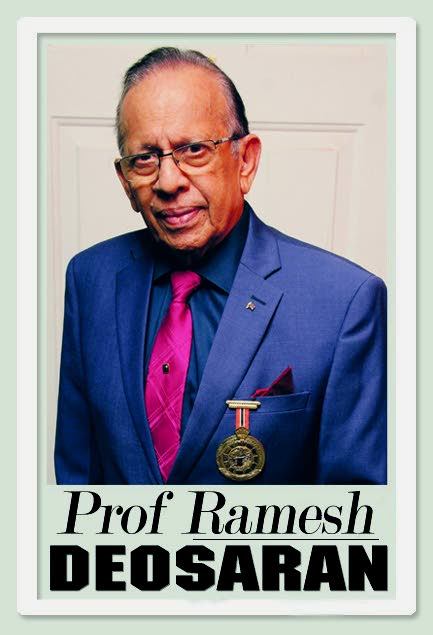Do we have a 'fake democracy?'

Having perused the Report of the National Advisory Committee on Constitutional Reform (197 pages), I congratulate the eight-member committee, chaired by former speaker Barry Sinanan, for its obviously hard work in producing a viable basis to stimulate citizens’ interest in several critical constitutional matters – political representation, political performance, accountability and small-state democracy as a whole.
The current protracted controversies over Tobago’s political autonomy, the Salaries Review Commission report, the Privy Council ruling in the Auditor General’s appeal, financial overruns in the Tobago airport construction, awarding silk, etc, help expose the deficiencies in the system of political accountability and sanctions. And the population is left quite unsettled, with serious political implications.
These matters are directly connected one way or another to the powers and decisions of the executive, meaning, firstly, the Prime Minister and his ministers. The joint select committees merely duplicate the suffocating redundancy in Parliament.
However, the PNM government met it so. The British Westminster parliament is tightly locked down by its compelling history.
Ours is vastly different. Even so, they have protocols and codes of ethics to restrain their executive.
The results from the Advisory Committee’s report reveal a very high level of public dissatisfaction with the current electoral and political system, executive powers, weaknesses of Parliament and non-performing ministers.
One constitutional remedy proposed is to have a president directly elected by the people – 30 per cent of the respondents said so for government structural reform while 50 per cent said so for executive reform.
But it is more than just numbers; it is the democratic principle. Last April, I already suggested the benefits of a “directly elected president” and an executive outside the legislature.
While I appreciate the Advisory Committee’s view of this country being politically “contradictory,” etc, it is precisely because of that that constitution reform requires courage, vision and a fresh understanding of fuller democracy for us. Does every man or woman’s natural vote (eg through proportional representation) count in the artificial first-past-the-post?
Given the “separation of powers” doctrine and French political philosopher Baron de Montesquieu’s warnings, our Parliament’s apparent restrictions in demanding not only accountability but sanctions would make some believe the system is a “fake democracy” – a question for Caricom post-colonial states too.
So how could Parliament properly command the executive to account to the legislature? It can’t now.
Why? As I said before, the answer lies not merely in the early wisdom of the father of the revered doctrine of separation of powers between the judiciary, executive and legislature, Montesquieu, but in his powerful corollary: “When the legislature and executive powers are unified in the same person or same body, there can be no liberty.” Here it is lawful but neither logical nor democratic.
This is where the powers of the prime minister enter. And further, where the undemocratic presence of the executive sits comfortably in the legislature.
We don’t need rocket science or any legal luminary to understand the democratic shortcoming here. Or if someone, high or low likes it so, it would be helpful to hear his or her reasons.
In this, nobody could be 100 per cent correct. The PNM conference paper by Minister in the Ministry of National Security the affable Keith Scotland still has some way to go.
In case, you went to close the fridge and didn’t read my column of December 1, I repeat Montesquieu’s other warning: “The tyranny of a prince is not so dangerous to the public welfare as the apathy of citizens in a democracy.”
So the reform imperative also lies in the public hands which reminds of my late colleague Prof Selwyn Ryan calling us “a nation of sheep” in an early 1977 Express column. Surely by now we should have a few political tigers.
Where is the Opposition in this important matter? Couldn’t UNC leader Kamla Persad-Bissessar, MPs Saddam Hosein, Wade Mark, Dr Roodal Moonilal, Jearlean John, Jayanti Lutchmedial-Ramdial and even Dinesh Rambally say or do something? This is the people’s “country-first” business.
The UNC hesitates to its disadvantage. It is not enough for their “on-the-warpath” leader to criticise the PNM government for “constitution reform deflection.” What about a town hall consultation on constitution reform?
Whether the government “bobs and weaves” over the advisory committee’s report towards the elections, the Opposition must declare its position. Or does its hesitation implies that the UNC, if it wins, is prepared to have both the executive and legislature sitting comfortably together, without the accountability the UNC has been persistently asking for.
Note: The marginal constituencies, especially along the East-West Corridor, have a relatively high population of independent, issue-thinkers – refusing to remain slavishly trapped by the mimicry syndrome.
There is a sad note to all this, though. Of the ten people who contributed to the 1974 Wooding Constitution Commission Report, nine died without seeing any part of their report accepted. So too with Sir Isaac Hyatali's 1988 Constitution Commission: six of its eight members have died.

Comments
"Do we have a ‘fake democracy?’"